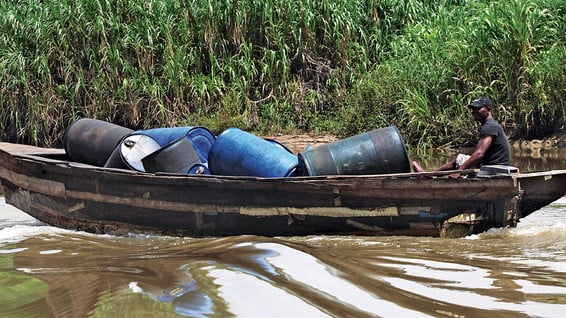Nigeria loses “as much as 30 percent” of its oil to theft despite halt in militancy in the oil-rich Niger Delta, according to Bloomberg.
In a report detailing the implications of reported cases of pipeline vandalism on the nation’s economy, the global medium beamed searchlight on the petroleum sector and the danger oil theft portends both in the short and long run.
It noted that to help to keep off oil thieves, companies now employ the use of surveillance helicopters equipped with infrared cameras as well as “all sorts of things” – in addition to security measures put in place by the federal government.
“They’re also experimenting with drones and cages on wellheads rigged with alarms,” the report noted, “but nothing seems to fix the problem.”
Advertisement
Quoting Wood Mackenzie, a consultant company based in the UK, the report said with the help of a “fragile” peace accord with militants, Nigeria’s output has risen “more than 20 per cent since August to almost 1.8 million barrels a day” – but the continued cases of pipeline vandalism in the Niger Delta still “threatens” the country’s target of exceeding 2 million a day.
Gail Anderson, a Scottish researcher at WoodMac expressed sadness that the theft being reported, just like change, is “constant.”
“It’s a big amount of crude being stolen. Nigeria is selling much less oil on the international market than what is coming out of the ground,” he was quoted to have said.
Advertisement
As a case in point, the report cited Agbada oil flow station, which is owned by Royal Dutch Shell Plc and situated in Port Harcourt, where it said the production output has been affected with oil wells closed for three weeks running following a pipeline leak.
“Who knows when we’ll be back up,” Wilcox Emmanuel, the facility’s manager, told Bloomberg.
“The 60,000-barrel-a-day flow station…idle for most of June illustrates the nation’s struggle to restore deliveries of its most vital resource. Even after the government quelled a militant uprising that sent production to a 30-year low last August, smaller-scale sabotage caused by people trying to steal oil remains rife,” the report said.
“Damage caused by theft, in terms of lost output and pollution, can be just as severe as from the armed attacks and bombings by rebels, which last year knocked out terminals including Shell’s Forcados and Qua Iboe, run by Exxon Mobil Corp.”
Advertisement
Tayo Oginni, a staff at Nigeria LNG Limited, told the medium that supplies to Nigeria’s liquefied natural gas plant at Bonny export terminal in the Gulf of Guinea fell 10 percent during an outage following a leak on the pipeline taking Agbada’s crude to Bonny.
He said Shell had, as a result of the leak, declared force majeure – a legal clause that allows it to miss deliveries.
“Nigeria LNG Limited has looked at gas transport options other than pipelines, given their vulnerability, but so far hasn’t found an affordable alternative,” Oginni was quoted to have said.
Although there has been increased surveillance by the Nigerian navy as well as other security agencies in the region, companies are also making individual efforts to sustain production.
Advertisement
“We are trying all sorts of things, you wouldn’t believe it,” Igo Weli, a manager at Shell, told Bloomberg.
Knowing the level of threat posed by oil vandals, he asked: “How do you protect thousands of kilometers of pipelines against people who are out to sabotage them?”
Advertisement
On Wednesday, Maikanti Baru, group managing director of the Nigerian National Petroleum Corporation (NNPC), put the current production level at 2 million barrels per day.
Advertisement
Add a comment







